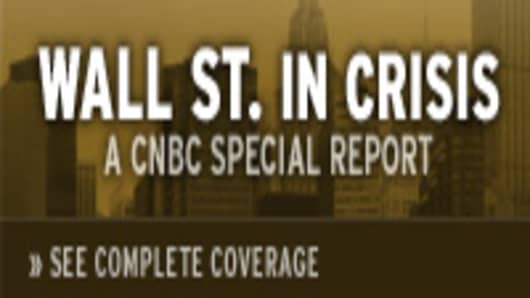The Federal Reserve, meeting during an unprecendented crisis on Wall Street, decided to leave interest rates unchanged but expressed concern about the crisis escalating.
The Fed's action to keep rates at 2% was a disappointment to investors, who were hoping that recent turmoil in financial markets would prompt the central bank to resume cutting interest rates.
In its statement, the Fed said "strains in financial markets have increased significantly and labor markets have weakened further." However, the central bank said it also remained concerned about inflation pressures.
"The downside risks to growth and the upside risks to inflation are both of significant concern to the committee," the Fed officials said.
Much of the Fed's statement resembles what it has said at various times during the year-old financial crisis, including its pledge to "monitor economic and financial developments carefully and ... act as needed."
Investor Advice:
Inflation hawks might be pleased by the statement because the Fed apparently thinks it is premature to declare an end to the price-pressures of high oil prices, even though they have have fallen by a third since late July.
The Fed's renewed concern about the economy is apparent in its decision to call attention to "some slowing in export growth," a relatively new development, and closely tied to the rebound of the dollar.
The recent deterioration of the job market, howver, did not warrant any special mention, as the Fed used roughly the same language as in its August policy statement.
"I believe the Fed made the right call on the rate decision but it is hard to take much comfort from a policy statement that seems so oblivious to recent developments," said Normura International Chief Economist David Resler, referring to what he calls a "growing body of evidence showing the downside growth risks have worsened with the inflation risks have moderated."
Until recently, financial markets had expected the Fed to hold fire. But expectations of a quarter-point cut grew after the bankruptcy of 158-year-old Lehman Brothers Holdings, the sale of investment bank Merrill Lynch to Bank of America, and a scramble for cash by insurer American International Group.
The swift-moving events have rattled global financial markets and threaten to exacerbate a credit crunch that has already helped push the U.S. economy toward recession.
On Sunday, the Fed said it would accept a wider range of collateral, including equities, from investment banks seeking central bank loans in an effort to help keep markets functioning.
The central bank also pumped $50 billion into the financial system earlier on Tuesday in addition to the $70 billion it added on Monday.
The moves led some to believe that the Fed was taking other steps besides cutting interest rates to keep the credit crisis from getting worse.
“The Fed has been separating credit facilities and interest rate reductions for sometime now,” says Robert Brusca, chief economist at Fact & Opinion Economics. “If interest rates were higher there might be some sense in lowering them, but they're not. I think the Fed wants to keep that powder dry."
Some economists were surprised, even dumbfounded, by the Fed's decision.
"Wall Street is in danger of sinking, the markets are in freefall, and the Fed refuses to throw us a lifeline," Bank of Tokyo-Mitsubishi's Chris Rupkey told clients in a note. "Time will tell if this was the correct course of action. The financial panic and fear of counterparty risk is the highest since the Great Depression, extraordinary measures seem to be called for, yet policymakers are staying the course."
Still, with the downfall of Lehman Brothers, AIG's funding problems and worries about other financial institutions such as Washington Mutual, the markets remain unsettled. And that's raised expectations that the Fed would step in with a rate cut to calm things down -- or at least clearly signal it was now leaning in that direction.
"Not in this statement," said Brusca. "The Fed would like to be a little more sure of inflation falling."
—Reuters and AP contributed to this report.



